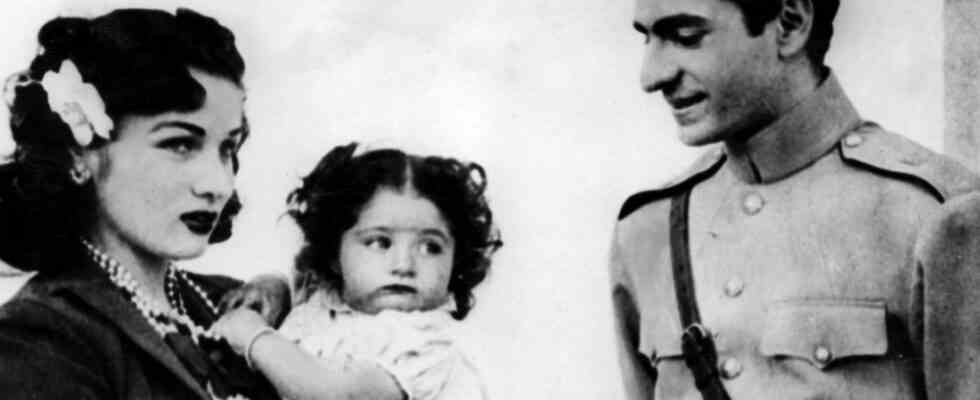The generation of today’s great-grandmothers, let’s say, was reliably kept up to date by the West German tabloid press about the marital drama of the last ruler on the Peacock Throne, Shah Mohammed Reza Pahlavi. However, only since Soraya Esfandiary Bakhtiary, half of German descent, had become his wife in 1951 and allegedly also his great love. After a tragic separation due to childlessness, public interest quickly shifted to the hereditary successor Farah Diba, but Soraya remained prominent as a “sad jet set princess” until she was laid to rest in Munich’s Westfriedhof.
But who remembers her predecessor? Fausia, the beautiful sister of corrupt Egyptian King Farouk I, was married to the heir to the Persian throne in 1939 to strengthen ties between the two countries. A daughter was born, but Fausia was no longer interested in producing male offspring. In 1945 she left the Shah and returned to Egypt, where she had to wait another three years for a divorce.
A little boulevard in the back of the mind increases the reading pleasure of Amir Hassan Cheheltan’s new novel “A Love in Cairo”, which should definitely be in the intention of the inventor. To a certain extent, the title and setting mark a turning point in the work of the Iranian, who was born in 1956 and who, after a few years in exile, has long since returned to his homeland, where most of his books are either not allowed to appear at all or are only censored. As a novelist, he had previously documented important stages in Iranian history, from the early 18th century through the Islamic revolution of 1979 to the present day, and above all described the capital Tehran in changing epochs in a multifaceted and colorful way metropolis of the Arab world, at a historical but relatively recent point in time when the complicated relationship between Iran and Egypt once again passed through a critical phase.
The Love Gone: A Defender of the Cultural and Spiritual Superiority of the Orient
In the autumn of 1947, an Iranian diplomat known as “the ambassador” took up his post in the Egyptian capital with urgent assignments: he was to persuade the renegade Fausia to turn back and he was to ensure that the corpse of the Shah, who had died in South Africa, was returned -father, who is temporarily stored in a Cairo mosque, is transferred to Tehran, including some valuables. The aim is also to ensure that Saudi Arabia and Iran resume diplomatic relations after four years of ice age. All of this against the background of the threateningly escalating conflict in Palestine and a cholera epidemic that is only hesitantly abating. But although his missions, with the exception of the third one, are difficult or hopeless, the ambassador, a man of fifty, does not seem to be working to his full capacity: between negotiations and dispatches, conspiratorial meetings and elegant receptions, he still finds leisure, an erotic project trace the origins of which date back a decade and a half.
At that time he had met an American Sanskrit student in Paris, who fascinated him not only because of her external charms, but also as a militant champion of the cultural and spiritual superiority of the Orient. The moderately westernized ambassador had taken the opposite position, but above all regretted that the “beautiful gazelle” was in a relationship with a much older and very unsightly Indian philosopher. Fate has it that this couple, now married, now reside in Cairo. Contact is renewed and the ambassador wins the favor of the lady, who is now forty and the mother of a daughter, but has lost none of her beauty and esprit. In the course of the affair, the notorious womanizer becomes entangled in feelings that increasingly worry him.
Here, too, Amir Hassan Cheheltan has embedded a wealth of stories in conversations, debates and strolls through the city, conveying knowledge in a relaxed manner: about historical connections and controversies, about the relationship between Islam and Judaism, about a region of the world that is so rich in culture like coveted raw materials and politically a powder keg. In addition, the author succeeds in a literary trick. The ambassador is a figure you really don’t want to have anything to do with: sexist to the point of rejection, racist too, bloated with vanity right down to his casually mentioned “pot belly”, and also endowed with dubious qualities that favor diplomatic careers in problem states. Cheheltan has a few self-confident women appear who stand up to him. Otherwise, he leads his hero through Cairo on the threads of ironic distance and manages that people are happy to follow him despite everything, on his paths between the office, the royal palace and private retreats as well as into his thoughts, conversations and love affairs.
Until at some point you have the feeling of being stuck in a waiting loop, just like the ambassador, where nothing groundbreaking will happen anymore. Then, for better or for worse, the envoy has to change country again and the reader the book. Even if the ending, which is absolutely ready for the tabloids, leaves some things in the balance: World history then continued undeterred.

